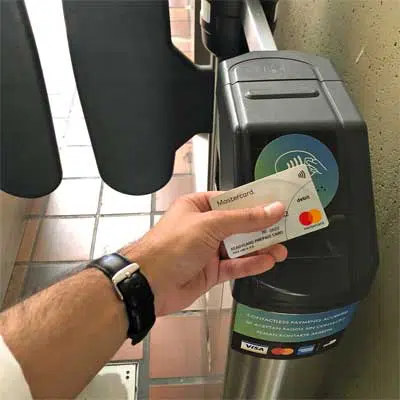A leading credit-union service organization reported Wednesday that it has distributed half a million contactless payment cards through some of its members, and Mastercard Inc. has paired up with a French investment firm with an eye on bringing new fare technology to mass-transit systems.
St. Petersburg, Fla.-based PSCU says it has distributed 500,000 contactless cards this year to members of 14 of its owner credit unions through routine card re-issuance. In 2020, the organization expects to issue more than 3 million contactless plastics for over 100 credit unions through regular re-issuance or mass replacements of existing cards.
“At PSCU, we strive to ensure that our owner credit unions are at the forefront of the latest payment trends and innovations—and that their members’ accounts are the ones getting used most frequently,” Jeremiah Lotz, managing vice president of digital experience and payment products at PSCU, said in a news release. “Offering and providing owners with contactless cards is one of the many ways in which we help our credit unions achieve top-of-wallet status.”
Banks and credit unions typically are getting contactless cards into the hands of consumers by replacing contact-only EMV chip cards with so-called dual-interface EMV cards that support both contact and contactless transactions, the latter through near-field communication technology. Visa Inc. chief executive Alfred Kelly recently reported the company already had meet its 2019 goal of having 100 million contactless Visa cards in the U.S. by the end of 2019. Visa is aiming for 300 million contactless cards by the end of next year.

PSCU said its 2019 Eye on Payments study found that “despite the early stages of contactless card issuance by financial institutions, about one-fourth of [survey] respondents already have a contactless card and use it at least a few times per month. Of those that have and use a contactless card, convenience, ease/speed of use and security are the primary motivators for doing so, while the primary reason consumers do not use their contactless card is due to lack of acceptance at stores they frequent.”
Meanwhile, mass transit continues to get attention from the payment card networks eyeing millions of contactless transactions currently made with cash or proprietary fare systems. Mastercard announced Wednesday that it is working with Meridiam SAS, a French investment firm with offices worldwide, to help budget-constrained cities find financing for infrastructure, including transit infrastructure. The pair-up is part of the Mastercard-initiated City Possible, a public-private partnership program.
Meridiam is expected to help finance what Mastercard termed “digital ticketing” in North America, but specifically where and other details weren’t disclosed. A Mastercard spokesperson tells Digital Transactions News by email that Meridiam “is a world-class global investor that specializes in the development, financing, and management of long-term and sustainable public-infrastructure projects and assets in the three core sectors: mobility, energy transition, and social-infrastructure sectors. Meridiam will contribute to the development, financing and management of sustainable urban transport infrastructure projects initially in North America.”
Mastercard’s role, the spokesperson says, will be to “provide learnings from our global network of cities from City Possible, key expertise in the transit space, and contactless technology to the alliance.” The company expects to add more partners in other markets later.
Mastercard already has been involved in contactless fare-payment upgrades in New York City, London, and other large cities. Visa, too, has been active in contactless transit payments.





